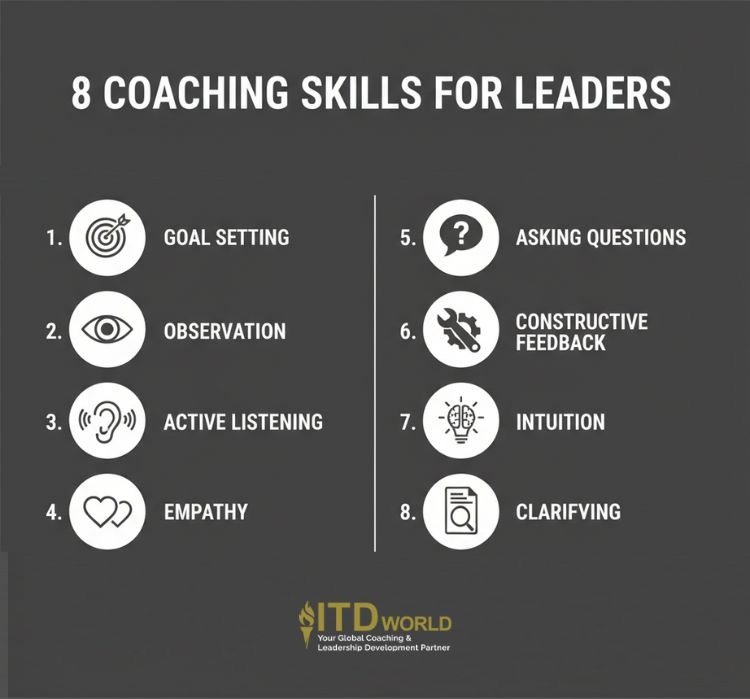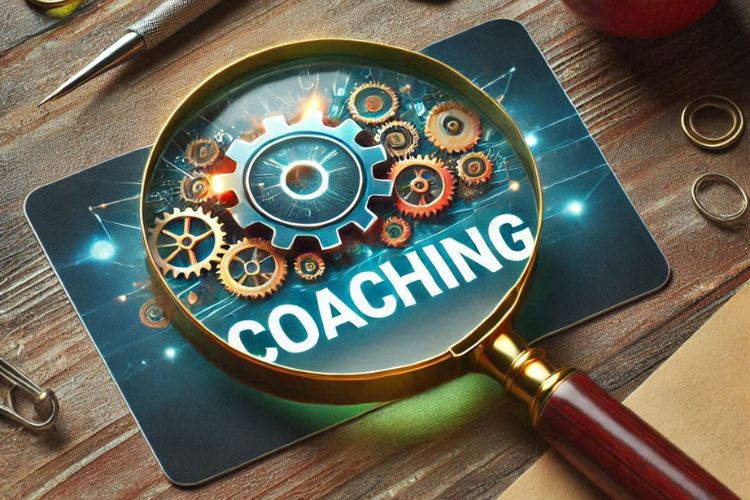Whether you’re a professional coach, a leader/ manager who would like to utilize coaching to support team members’ development or for other life situations, it’s critical to have a clear understanding of the key coaching skills – so as to reap the most optimal benefits from the process.
Coaching is the application of specific skills to assist others in visualizing their goals. According to the International Coaching Federation (ICF), it involves a collaborative process between a coach and a client (also called a coachee) to help the latter stimulate their creative thinking, assess personal potential, and develop skills necessary for professional growth.
The starting point of coaching is the desire to help the coachee learn and grow. A good coach doesn’t see himself as an expert who has all the answers or the ability to solve every problem. Instead, they see themselves as “catalysts” whose purpose is to facilitate people’s self-learning.
|
Author: Jonathan M. Pham |
Highlights
- Coaching skills encompass techniques like active listening and questioning; the aim is to help coachees discover their own strengths, weaknesses, and solutions, rather than providing direct advice. In today’s disruptive environment, leaders need such skills to empower employees, foster growth, build stronger relationships, and drive performance more effectively.
- Effective coaching involves skills like goal setting, observation, active listening, empathy, questioning, constructive feedback, intuition, and clarification.
- The success of coaching hinges on mindful communication – when one considers not only the intended message but also how it’s received, as well as uses respectful language and acknowledges nonverbal cues.
- Tips for developing coaching skills include but are not limited to improving emotional intelligence, being flexible, and asking open-ended questions.
What are Coaching Skills?
Coaching skills are the techniques and approaches that coaches make use of to better provide guidance, support, and feedback to coachees. These range from active listening and questioning techniques to creating a safe space for dialogue and brainstorming.
Unlike mentoring and training, coaching is not about giving advice. Rather, its focus is on enabling the coachee to figure out their own strengths and weaknesses – so that they may come up with solutions for themselves. It encourages them to find out what works best for them, and how to leverage that knowledge in the journey toward their ultimate goals. For all of these to work, the coach needs to possess certain skill sets to optimally fulfill their role.
Read more: Coaching vs Mentoring – Define the Differences
Why Leaders Need to Develop Coaching Skills
In the current era of disruption, traditional command-and-control styles of management are no longer successful in achieving desired results. Instead, leaders need to take on the role of a coach and assist employees in adapting to new circumstances. They need to build up an environment where people feel safe and empowered to think, express themselves, and let their potential shine through.
Coaching allows people to gain insight into how they work best – while also allowing them to test out new ideas, strategies, or approaches that might help improve performance in the workplace. In addition, it assists managers in nurturing more meaningful relationships with their team members, which ultimately translates to increased loyalty and motivation.
Strong coaching skills are essential for any leader hoping to succeed in today’s ever-changing landscape. While it may take time to perfect these techniques, taking the initiative now will pay off greatly down the road as it increases efficacy and keeps morale high within the organization.
The role of the manager is becoming that of a coach.
Harvard Business Review

8 Effective Coaching Skills for Leaders & Managers
Coaching skills come in many forms and encompass a broad range of knowledge and abilities. For instance, good coaches are capable of recognizing potential within an individual or team – and allowing these strengths to grow into something greater. They also know how to identify areas for improvement and come up with a learning and development plan that best suits each person’s unique learning style.
Here, we review and map out 8 fundamental skills for aspiring coaches and leaders to work on.
-
Goal setting
A coach’s foremost task is to help the coachee map out their goals before developing a detailed action plan to visualize them. By coming up with SMART (Specific, Measurable, Attainable, Realistic, and Timebound) goals, coachees are better equipped to think clearly and move forward with clear objectives.
During the goal setting phase, it is recommended for the coach to frequently raise questions about the impact of an action (e.g: “How will ABC help achieve your goals?”) – so that the coachee may better analyze the situation and come up with a sensible plan. Additionally, great coaches are known for their ability to “turn problems into goals”. For instance, if the coachee complains about a difficult colleague, you may ask: “What do you think you can do to improve your relationship with this person?”.
Read more: 12 Leadership Coaching Topics to Drive Lasting Transformation
-
Observation & Evaluation
Observation is an essential coaching skill that people often overlook. Paying close attention to a coachee’s body language gives valuable insight into their feelings and state of commitment. By taking note of their posture, facial expressions and gestures, coaches may capture subtle nuances that enable them to accurately assess the situation and better guide their coachee.
At the same time, evaluations are crucial for progress tracking. By periodically checking in with the coachee, coaches can gauge learning progress and make necessary adjustments to the development plan.
-
Active listening
Active listening involves actively engaging with a coachee, rather than just passively listening to what they have to say. To be an effective listener, the coach must strive to put aside their own thoughts and ideas – so that they may give the coachee their full attention. This may prove to be especially challenging for those who are in positions of authority or management, but it is a valuable leadership tool that will make all the difference in successful coaching sessions.
When someone takes the time to truly listen, it can be an incredibly powerful and meaningful experience. By truly being present and offering your undivided attention, you are effectively conveying two messages:
- that you are there to support them and
- that you expect them to take responsibility for their actions and follow through on commitments they’ve made.
There are a wide range of techniques/ models available for coaches to hone their active listening skills – such as open-ended questions, reflective listening, and paraphrasing. Above all else, however, one must remain curious about the possibilities of what their coachee can achieve, while showing genuine care for them as an individual.
-
Empathy
A natural result of observing and listening, empathy is an essential skill for business coaching, as it allows coaches to understand and accept the emotional states of their coachees. By being attentive and attempting to view a situation from their perspective, coaches are more likely to be able to properly understand and regulate thoughts and feelings that their coachees may be unaware of.
For instance, if a coachee is feeling angry at the way they have been spoken to by their boss, an empathetic coach might ask “Is that how you feel right now?”.
Developing empathy isn’t always easy, especially when it comes to trying to remain focused on another person’s feelings for extended periods of time. However, with practice, this should become second nature and enable great coaches to provide a truly unforgettable experience for both them and the coachee. An empathetic manager will keep their employees looking forward to their next training session, as it serves as an energizing break from the self-directed state they are usually in.
-
Asking questions
The purpose of asking questions is to guide the coachee away from their previously established pathways of thought into unexplored territories of possibility. By doing so, coaches may uncover novel conceptions which may not have been immediately apparent. Furthermore, it encourages the coachee to own these solutions by having them discover them themselves instead of being told what the answer should be. This in turn leads to greater levels of commitment and dedication toward making sure that these objectives are met properly.
Below are a few principles when it comes to asking questions in coaching:
- Don’t try to enforce your ideas: Refrain from directional questions that are presumptive in nature. Remember, your role is to help the coachee find their own solutions – not yours.
- Stimulate the coachee’s thinking: Try to ask questions that force the coachee to think deeply about their current situation, rather than simply focus on the facts.
- Be exploratory: Questions that begin with “what” and “how” will lead down a path of discovery – whereas “why”- may cause resistance or defensiveness.
Read more: Coaching Principles for Breakthrough Success
-
Providing constructive feedback
The most effective way to provide constructive feedback is by using the “sandwich technique” – a phrase that coaches should become familiar with. This involves starting on a positive note, then providing constructive criticism, and finally wrapping up with another positive thought or comment.
It is also recommended to be as specific as possible for delivering truly meaningful feedback. By mentioning tangible examples, you may rest assured that the points you are trying to make are understood correctly – and that no room for misunderstanding exists. Additionally, always ask questions such as “What do you think?” or “How could we improve this?” – so that the coachee may take an active role in their personal development.
Read more: Continuous Feedback – A Cornerstone of Modern Workplace
-
Acting on intuition
While business coaching is all about being analytical and focused on facts, it is equally important to trust your own intuition when it comes to dealing with the coachee. At the end of the day, their success is ultimately up to you, and there are many cases where subtle cues that may only be picked up by a coach with an intuitive feel for the situation can spell out whether a certain management style will work or not.
It is always best practice to use personal judgment whenever possible, as this ensures that coaches are more likely to be able to properly guide their coachees in ways that one might never think of. By doing so, together they may be able to reach amazing heights – both professionally and personally – and will in turn lead to better outcomes for the organization as a whole.
-
Clarifying
Another coaching skill that most guidance books and resources often leave out, clarifying involves the coach asking questions and summarizing what the coachee has said – so that both parties are on the same page. During this process, the coach should frequently look out for nonverbal cues from the coachee that may indicate whether or not they are satisfied with the direction of their progress.
To ensure no details are missed, coaches should consider raising questions like “Is there anything else you need to consider?” and “Do you feel you have enough knowledge to move forward?”. Additionally, it may be useful for both to settle on a means of keeping track of progress – so that communication does not become lost as goals are reached.
Finally, at the end of each conversation, coaches should come up with probing questions to check if the coachee is satisfied with their achievements. This helps ensure that all milestones have been properly achieved, rather than simply assuming that everything is complete.
Read more: 10 Characteristics of a Good Coach

Developing Your Coaching Skills Starts with Paying Attention to Communication
One area that is particularly crucial in coaching is how you communicate your message. What you say will directly affect the coachee’s immediate response – resistance or willingness to learn. Below are a few examples for demonstration:
| What you say |
What you convey
|
| Can I leave early? |
I’ll leave early even if it annoys you.
|
| Would you mind if I leave a little early? |
I really want to leave early, but I won’t if it upsets you.
|
| Will I drive? | I want to drive. |
| Do you want to drive – or do you want me to? |
I am completely comfortable no matter who controls the wheel.
|
| Will you drive? |
I don’t really want to drive.
|
You need to pay attention not only to the intended meaning of your words, but also to what others “hear” from them.
Now, if you say, “I want to leave a little early today, okay?”, you may actually be concerned that it might not be convenient for your coworker.
However, your co-worker might interpret your message as: “I’ll leave early whether you are OK with it or not, and you’ll have to stay here until late if need be.”
Therefore, it would be better to say something like this: “I really want to leave early today, but I won’t if you are in need of my presence. If you agree to let me go at this time, I will repay you later by allowing you to leave early in another day. Would that be OK?”

Why should we care about this in coaching?
The language used by coaches plays an important role in building trust and mutual respect between both parties. For instance, instead of imposing one’s opinion or making decisions on behalf of the coachee (“We will meet outside, that would be better”), it would be more beneficial for the coach to give permission (“I’ve found that coaching is often most effective if we’re talking outside of the office. So do you mind if we go for a coffee?”). This allows for the coachee to make their own decisions and be involved in the process, which is essential for a successful outcome in any coaching session.
Furthermore, being aware of nonverbal cues that accompany verbal communication can also greatly enhance one’s coaching skills. Pay attention to signs of when someone may need additional reassurance or encouragement during their journey towards self-improvement.
Read more: Self Leadership – The Art of Leading from Within
Tips on How to Develop Coaching Skills
Developing coaching skills is a process that requires plenty of effort. Taking a professional coach training course – such as the Certified Coaching & Mentoring Professional (CCMP) or the Certified Chief Master Coach (CCMC) – is always a worthwhile option; that said, here are some quick tips for leaders and managers to get started:
- Improve emotional intelligence in the workplace: Emotional intelligence is key for identifying and understanding the feelings and needs of your team.
- Take a “people-first” approach: Approach each interaction from a place of understanding and respect, rather than criticism or judgement.
- Listen actively: Encourage feedback from your coachees by asking questions, being attentive to body language, and showing genuine interest in their responses.
- Be flexible: Avoid rigid methods that may not be suitable for your team members. Adapt to their situation and find creative ways that may help achieve their goals.
- Practice communication skills: Pay attention to the words you use and how they might be interpreted. Practice active listening and try using more open-ended questions when coaching your employees.
Read more: Team Coaching – Guidelines for High Performance
Final Thoughts
Developing coaching skills often proves to be a challenging – and yet rewarding process. With the proper mindset and tools, it is possible to achieve great results in any coaching relationship. Remember that the most important element in any successful coaching session is to show empathy and respect for your coachee – this will create an environment of trust and mutual understanding that leads to positive outcomes.
Other resources you might be interested in:
- One-on-one Coaching: The Art of the Breakthrough
- Coaching Culture: Blueprint for Organizational Growth
- Executive Coaching: Building High-Performing Leaders
- Coaching Philosophy: How to Craft One That Defines Your Impact
- 9 Key Leadership Skills for the Future of Work


